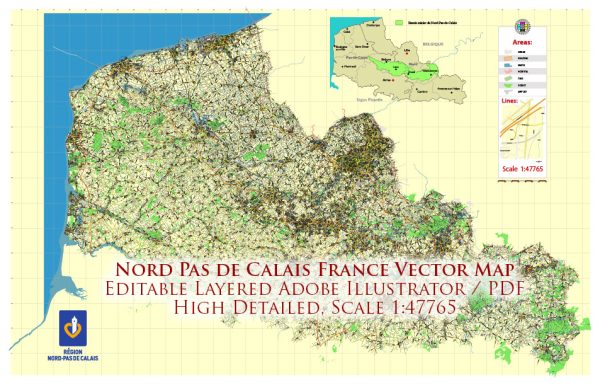The Nord-Pas-de-Calais region in northern France has a diverse geological history that has shaped its landscape and natural resources. Here is a brief description of the geology of the Nord-Pas-de-Calais region:
- Sedimentary Rocks: The region is primarily composed of sedimentary rocks. These rocks were deposited over millions of years in ancient seas and lakes. They include layers of limestone, sandstone, shale, and marl. The sedimentary rocks hold the key to understanding the region’s history, as they contain fossils and other clues about the past environment.
- Carboniferous Period: One of the most significant geological features of Nord-Pas-de-Calais is its association with the Carboniferous period. This era, which occurred approximately 360 million years ago, was marked by the deposition of vast amounts of organic material, leading to the formation of coal deposits. The coal mines in the region played a vital role in the industrialization of France.
- Folded and Faulted Rocks: The region has experienced considerable tectonic activity over its geological history, leading to the folding and faulting of the sedimentary rocks. This has created complex structures in the subsurface, which impacted the distribution of natural resources, including coal and oil.
- Chalk Cliffs: Along the coastline of the Pas-de-Calais department, there are iconic white chalk cliffs, notably at Cap Blanc-Nez and Cap Gris-Nez. These cliffs are composed of soft Cretaceous chalk, and their formation is closely related to the geological history of the area.
- Fluvial Deposits: The region’s river systems, including the Lys, the Aa, and the Scarpe, have contributed to the deposition of alluvial sediments, influencing the landscape and soil composition in the low-lying areas.
- Glacial Deposits: During the Pleistocene Ice Age, the region was subjected to glacial activity. Glacial deposits, such as moraines and glacial till, can be found in parts of Nord-Pas-de-Calais, influencing the local topography.
- Limestone Plateaus: In some areas, particularly in the Pas-de-Calais department, there are limestone plateaus formed from the accumulation of marine sediments. These plateaus can be covered by soils with different characteristics.
The geology of Nord-Pas-de-Calais has not only played a significant role in the industrial history of the region, particularly through coal mining, but it also influences the agricultural practices, the landscape, and the distribution of natural resources. The combination of sedimentary rocks, tectonic activity, and glacial influence has created a geologically diverse and historically significant area.


 Author: Kirill Shrayber, Ph.D. FRGS
Author: Kirill Shrayber, Ph.D. FRGS